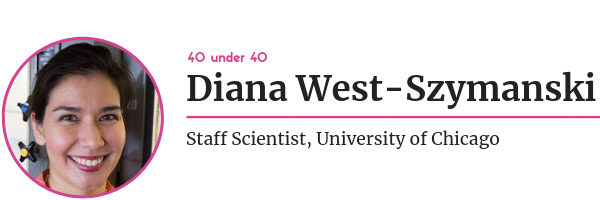Epigenetic modifications direct the script of life – our DNA – and whole-genome epigenetic signatures can reveal underlying clues into an individual’s health. With the mentorship of Professor Chuan He, Dr. Diana West-Szymanski is developing a blood test that can detect these clues and provide potentially life-saving cancer diagnoses and treatment options to patients. View Halo Profile >>
Tell us about your research…
I’ve been very fortunate to have worked on a few cancer biology projects in recent years. My current work focuses on an epigenetic technology that was invented by Professor Chuan He. The technology enables us to determine epigenetic signatures on circulating cell-free DNA from blood samples. Those epigenetic signatures can then be used to develop clinical diagnostics that will equip physicians and patients with diagnostic and prognostic information.
The technology enables us to determine epigenetic signatures on circulating cell-free DNA from blood samples.
Additionally, as a former postdoc under Professor Suzanne Conzen, I studied the role of glucocorticoid receptor in breast cancer biology. That training prepared me for the exciting work I get to do now.
Can you explain that to a non-scientist?
Professor He’s technology is being used to develop a very sensitive blood test that can detect a pattern of modification on DNA isolated from blood samples. These DNA patterns can distinguish between healthy individuals and those with cancer.
How could it someday impact patient lives?
The blood test will ultimately be used to detect cancer with prognostic information to help physicians determine the best treatment for patients.


